Hell on Wheels

In the line of work I'm pursuing, I can't predict what I'll face next week, or tomorrow for that matter. Sometimes I know what I'll be going to shoot pictures of, and the feelings I plan to feel are nothing like those that are actually there when I arrive.
This week was that type of situation.
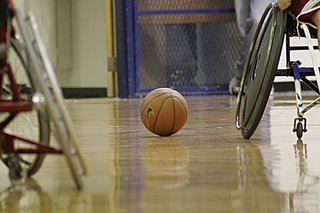
I came in contact with something I had only heard of, which has been the case in several of my shoots. I've covered tornado damage, try outs for the Vagina Monologues, fire fighters training, told the story of an airplane mechanic and his dog, Duchess, among tons of other assignments, none of which I was able to predict the feelings I experienced once I arrived, no matter how simple or complex.
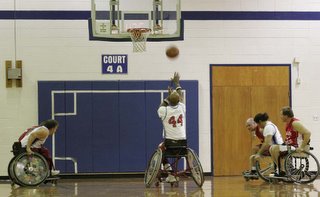
This was by far one of the most motivating tales I could tell. In Lexington this weekend a basketball tournament was being held, but you may have been surprised if you were walking in and instead of feet scampers and shoe squeaks and players landing after rebounds, you heard crashing metal, popping tires, and bodies hitting the floor with nothing breaking their fall. These are the types of sounds you hear at a National Wheelchair Basketball Association game.
As I walked into the gymnasium, I noticed I was the minority, in that I wasn't in a wheelchair. The tournament was going on all weekend, and there were enough teams to where they played from 9 a.m. - 6 p.m., given that some teams would play again later that night, so as you may imagine, there were a lot of "handicapped" people around.
Here is the first mistake you subconsciously develop of people who are bound to use prosthetics and wheelchairs: they're handicapped. I watched two, full length games this weekend, which by the way are played by the exact same rules and time length as any other NCAA game, and these athletes are not handicapped.
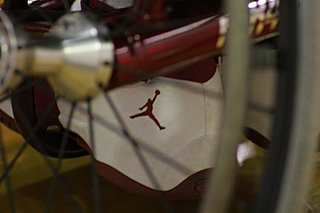
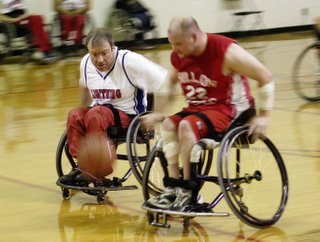
Just as in NCAA, for every two pushes to the chair (or two steps) you must dribble the ball. This tournament is not something that is held just to "comfort" these players. This is a difficult sport, one that I'm not so sure I could step up to so quickly. The rules are strict, the games intense and the players are tough as nails.
They take charges, get fouled, and fall, just as much as players in an average game of basketball.
They fall...
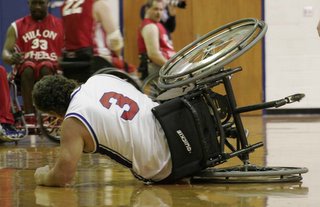
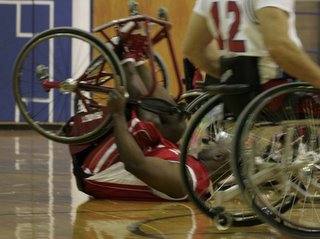 they get fouled...
they get fouled...
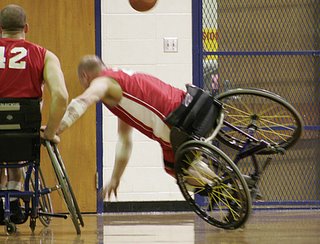
...but they get back up,
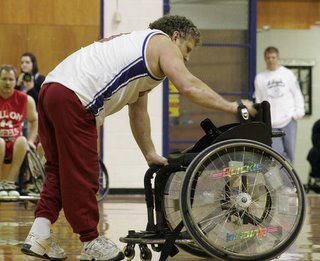
no matter how hard they get hit.
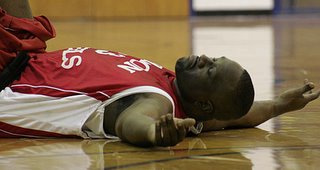
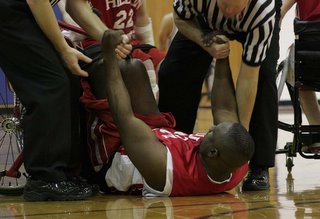
It's amazing to see some of the players flip themselves up on their own, and push off as if nothing happened. This time the player, Herb from Louisville, wasn't able to get back up due to how he landed, but he didn't slow down from the hard hit.
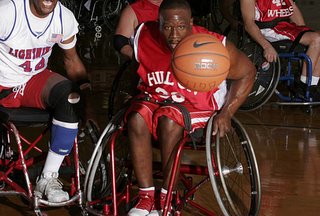
The team we followed was from the Lexington/Louisville area. They were defeated by a team in the top two rankings of the league, and again by a team of which I'm not sure as to where they were from.

It was so motivating to see people who most of us would just write off as not being capable of doing so much, to be out and about, doing things that I don't even take advantage of my ability to do. I almost felt guilty for standing on the same court sometimes, just for my lack of appreciation of what I could be doing.
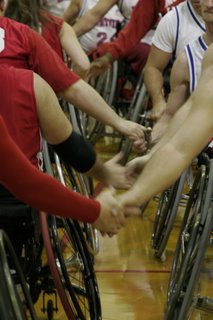
In the end though, I did develop a better appreciation for what motivation truly is. I noticed on the sideline, there was a row of elderly, all in wheelchairs. After the game the players went to each of the fans and gave them their own small basketball and talked to them about whatever the patients (from Cardinal Hill Hospital) wanted to ask. This was my moment of realization. Even though these people were bound to their wheelchair, they were still young enough to be out and doing something they love. They were actually being envied by many of the patients. I heard one man comment on how much he enjoyed the game and tell the players they did well.
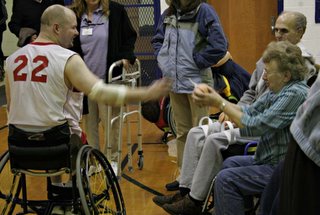
Something I went into thinking it would have been a story of people conquering grief and wishing they were still able to do what they truly loved, turned out to be a love story. I thought this type of life would be hell on wheels. I was entering this assignment in ignorance though, because these aren't people who wish they could turn back time and just walk one more day. Sure maybe at one point they went through a grieving stage, but now they're not playing basketball because it's just something offered to the "handicapped". This was something that these athletes had to train for, and work to be able to do. They love game and mostly, their ability to play it.
 Blog Flux
Blog Flux